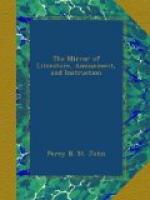[8] See MIRROR, vol. xii. page 34.
* * * * *
In Germany, seminaries for the education of popular teachers, are conducted by distinguished divines of each state, who, for the most part, reside in the capital, and are the same persons who examine each clergyman three times before his ordination. Unless a candidate can give evidence of his ability, and of, at least, a two years’ stay in those popular Institutions where religious instruction is the main object, he is not allowed to teach any branch of knowledge whatever.—Russell’s Tour in Germany.
* * * * *
MUNGO PARK.
Captain Clapperton being near that part of the Quorra, where Mungo Park perished, our traveller thought he might get some information of this melancholy event. The head man’s story is this:—“That the boat stuck fast between two rocks; that the people in it laid out four anchors a-head; that the water falls down with great rapidity from the rocks, and that the white men, in attempting to get on shore, were drowned; that crowds of people went to look at them, but the white men did not shoot at them as I had heard; that the natives were too much frightened either to shoot at them or to assist them; that there were found a great many things in the boat, books and riches, which the Sultan of Boussa has got; that beef cut in slices and salted was in great plenty in the boat; that the people of Boussa who had eaten of it all died, because it was human flesh, and that they knew we white men eat human flesh. I was indebted to the messenger of Yarro for a defence, who told the narrator that I was much more nice in my eating than his countrymen were. But it was with some difficulty I could persuade him that if his story was true, it was the people’s own fears that had killed them; that the meat was good beef or mutton: that I had eaten more goats’ flesh since I had been in this country than ever I had done in my life; that in England we eat nothing but fowls, beef, and mutton.”—Clapperton’s Travels.
* * * * *
SILK.
We find in a statement of the raw silk imported into England, from all parts of the world, that in 1814, it amounted to one million, six hundred and thirty-four thousand, five hundred and one pounds; and in 1824, to three millions, three hundred and eighty-two thousand, three hundred and fifty-seven.[9] Italy, which is not better situated in regard to the culture of silk than a large portion of the United States, furnishes to the English fabrics about eight hundred thousand pounds’ weight. The Bengal silk is complained of by the British manufacturers, on account of its defective preparation; by bestowing more care on his produce, the American cultivator could have in England the advantage over the British East Indies. It




